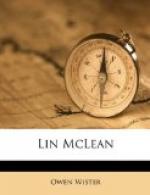There were ladies in that blue plush car for Boston who looked at Lin for thirty miles at a stretch; and by the time Albany was reached the next day one or two of them commented that he was the most attractive-looking man they had ever seen! Whereas, beyond his tallness, and wide-open, jocular eyes, eyes that seemed those of a not highly conscientious wild animal, there was nothing remarkable about young Lin except stage effect. The conductor had been annoyed to have such a passenger; but the cow-puncher troubled no one, and was extremely silent. So evidently was he a piece of the true frontier that curious and hopeful fellow-passengers, after watching him with diversion, more than once took a seat next to him. He met their chatty inquiries with monosyllables so few and so unprofitable in their quiet politeness that the passengers soon gave him up. At Springfield he sent a telegram to his brother at the great dry-goods establishment that employed him.
The train began its homestretch after Worcester, and whirled and swung by hills and ponds he began to watch for, and through stations with old wayside names. These flashed on Lin’s eye as he sat with his hat off and his forehead against the window, looking: Wellesley. Then, not long after, Riverside. That was the Charles River, and did the picnic woods used to be above the bridge or below? West Newton; Newtonville; Newton. “Faneuil’s next,” he said aloud in the car, as the long-forgotten home-knowledge shone forth in his recollection. The traveller seated near said, “Beg pardon?” but, turning, wondered at the all-unconscious Lin, with his forehead pressed against the glass. The blue water flashed into sight, and soon after they were running in the darkness between high walls; but the cow-puncher never moved, though nothing could be seen. When the porter announced “Boston,” he started up and followed like a sheep in the general exodus. Down on the platform he moved along with the slow crowd till some one touched him, and, wheeling round, he seized both his brother’s hands and swore a good oath of joy.
There they stood—the long, brown fellow with the silk handkerchief knotted over his flannel shirt, greeting tremendously the spruce civilian, who had a rope-colored mustache and bore a fainthearted resemblance to him. The story was plain on its face to the passers-by; and one of the ladies who had come in the car with Lin turned twice, and smiled gently to herself.
But Frank McLean’s heart did not warm. He felt that what he had been afraid of was true; and he saw he was being made conspicuous. He saw men and women stare in the station, and he saw them staring as he and his Western brother went through the streets. Lin strode along, sniffing the air of Boston, looking at all things, and making it a stretch for his sleek companion to keep step with him. Frank thought of the refined friends he should have to introduce his brother to; for he had risen with




